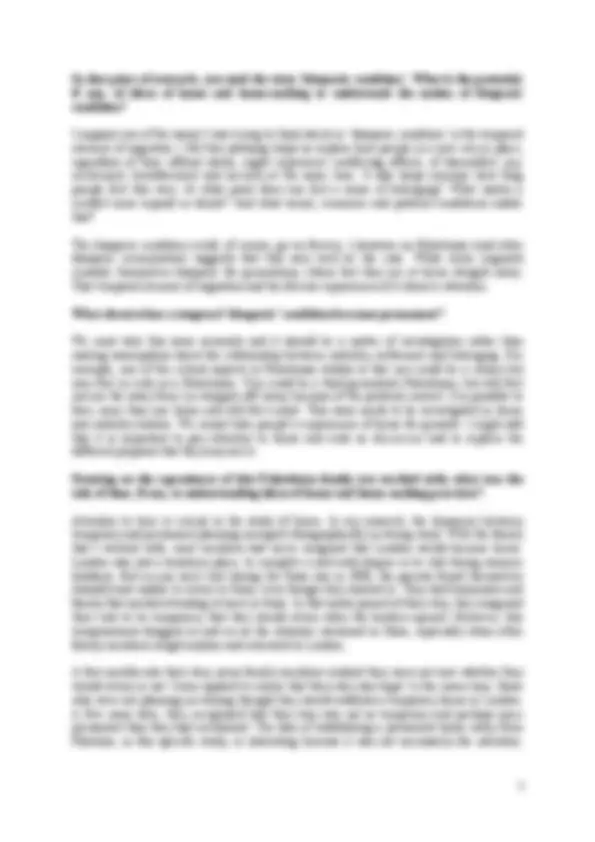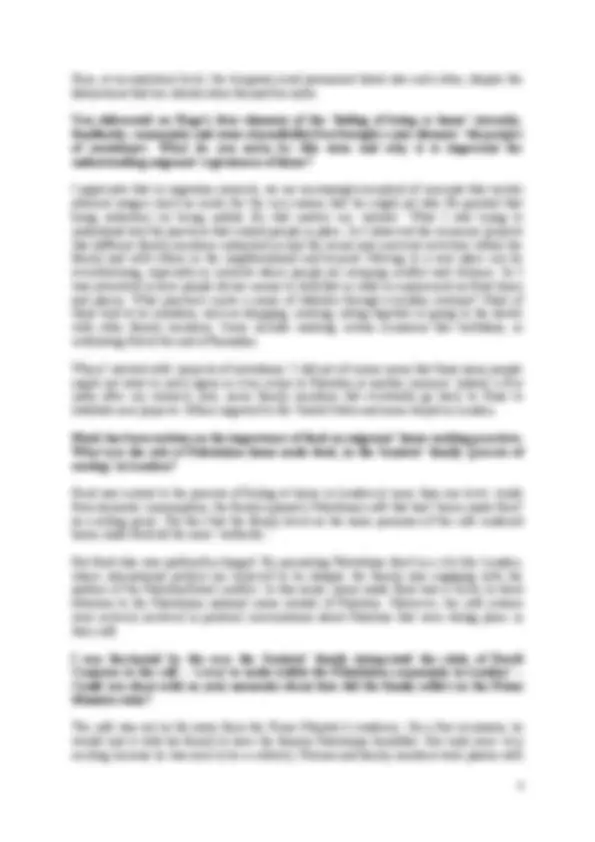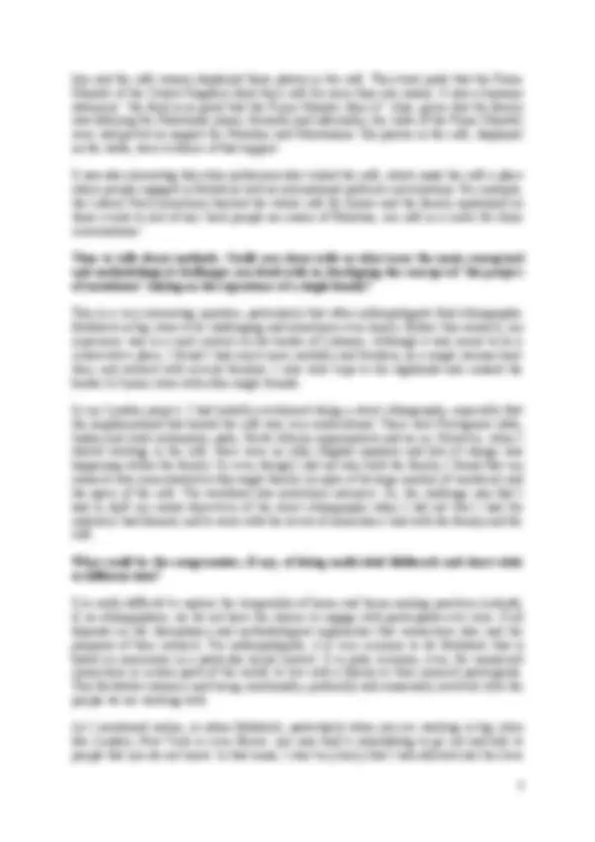





Study with the several resources on Docsity

Earn points by helping other students or get them with a premium plan


Prepare for your exams
Study with the several resources on Docsity

Earn points to download
Earn points by helping other students or get them with a premium plan
Community
Ask the community for help and clear up your study doubts
Discover the best universities in your country according to Docsity users
Free resources
Download our free guides on studying techniques, anxiety management strategies, and thesis advice from Docsity tutors
Insights into the research of a social anthropologist focusing on the experiences of displaced Palestinians in London as they attempt to create a sense of home in a new place. The author discusses the importance of home as a concept and the role it plays in understanding the diasporic condition. The research highlights the practices of a Palestinian family in London, their attempts to recreate familiar routines, and the significance of food in their process of rooting in their new environment.
Typology: Study notes
1 / 7

This page cannot be seen from the preview
Don't miss anything!




Interview with Michelle Obeid Conducted by Luis Eduardo Perez Murcia at the University of Manchester, UK
Michelle Obeid is Lecturer at the Department of Social Anthropology, University of Manchester. Her current research focuses on the fluidity of social and political relatedness at the northeastern border of Lebanon and the social and economic processes of emplacement for Arab migrants in London. Michelle holds a PhD in Anthropology from London School of Economics. https://www.research.manchester.ac.uk/portal/michelle.obeid.html
Michelle, thank you very much for making time for this interview. I want to start asking you, who is Michele Obeid?
As a social anthropologist, I have been interested in a broad question that I have pursued in some way or another in different projects: How do people figure out how to live in the aftermath of social rupture?
My longest project has been in Lebanon, where I did ethnographic research in a town in the northeastern border with Syria. I was looking at how people lived their lives in the postwar period in an ambiguous place. The town at the border seemed to be at the margin of the nation state, and people felt they were also at the margin of society. I worked there at a time when it was unclear who governed that border – the Lebanese and Syrian states seemed to play a role at the same time. People had just gone through a civil war, and there was a lot of figuring out to do. So I was interested in how they thought of their lives in terms of their past, how they invented new ways of living (new forms of sociality, new livelihoods) and what border living meant for them.
My second project has been concerned with the movement of people and how they establish home in a new place. I worked with an extended Palestinian family that had made its way to the UK in the aftermath of the Gaza war in 2008. It was very interesting to see how people from a single family had very different arrival stories and diverse legal statuses. That was important because it challenges the way we think about and use categories such as ‘migrant,’ ‘diaspora,’ ‘refugee,’ ‘asylum seeker,’ or ‘citizen.’ How do we navigate these categories when they tend to overlap? I spent a year with this family who had established a café in London and tried to understand how home and a new life can be created in a new place, especially when the intention was not to migrate in the first place.
At a very personal level, what does the term ‘home’ mean to you and where is home for you?
I was raised in a family that experienced multiple migrations. I was born in Lebanon, but my family fled the war when I was a child. I spent my childhood in the United Arab Emirates and returned to Lebanon after the war. I then came to England for my postgraduate studies. At some point I thought that my home was Lebanon even though before that it was Dubai, because I grew up there. But then, I started feeling that England was more or less my home. At the same time, however, I started feeling ‘not at home’ in all these places. When I went to
Lebanon, I found myself annoyed with the very things that I missed while abroad. ‘Oh! Why don’t people queue in Lebanon, why is it so chaotic!’ And when I returned to England, I found myself complaining about the fact that people queued too much! I missed the warmth and chaos of Lebanon. That’s when I had this moment when I realised that I was the typical diasporic subject! I was at ease in more than one home and, at the same time, not fully at home anywhere.
So, in this sense, my personal trajectory might have somehow influenced my research interests. I myself came to the UK to study and ended up living and making a home here.
Could you tell our readers, why did you engage with the notion of home in your research?
I think that at some level, creating or recreating home is probably the most obvious and complex way of making life ‘normal’, since home seems to be the most ‘normal’ or ‘basic’ thing that humans everywhere need, regardless of what shape it takes. Home of course can be mobile, or different for different people. Yet, it is one of those things that is cross-cultural and universal. So exploring how one makes home and what it means in different contexts, in relation to people, place and even nation, makes ‘home’ a productive concept.
In my research with the Palestinian family in London, it struck me that one of their first projects was to make this new place feel familiar and safe. I observed certain practices that they were keen on recreating (big family meals; shopping expeditions etc.), practices that made them feel at ease in their new life. In a way, the notion of ‘home’ emerged ethnographically in the everyday.
In your analysis of the displaced Palestinian family settled in London you discussed how they attempted to create a sense of home away from the occupied territories. Could you tell us what do you mean by home and home-making practices in that account?
At the earlier stages of my research, I was particularly inspired by Ghassan Hage’s work on home-making. He suggests that home is something that invokes mothers’ food; it is something relevant to a sense of familiarity, a sense of networks, but also a sense of possibility. Whether in the kinds of businesses and livelihoods they were trying to embark on or at the very personal level, what my research participants were doing seemed to recreate familiar practices, at least at the earlier stages of their new migration. Familiarity was thus forged through identifying places where they could buy familiar food and recreating routines that resonated with practices back home. Sometimes, I saw over 20 members of the family having lunch together on a weekend when they all got together. They themselves joked about ‘bringing Gaza to London’ on such occasions, when they noticed how they took over the space of the café, leaving no room for patrons! They were recreating activities that were familiar to them before coming to London.
At the same time, they were also reshaping some of these practices in London. I was interested in the kind of possibilities that a city like London offered new migrants and how that shaped the temporality of home. So, when I observed home-making practices, I paid attention to the kind of routines that were repeated, those recreated and negotiated in this new setting and new ones that were adopted. It is in the combination of these that people attempted to create a feeling of security.
Here, at an analytical level, the temporary and permanent bleed into each other, despite the distinctions that our interlocutors themselves make.
You elaborated on Hage’s four elements of the ‘feeling of being at home’ (security, familiarity, community and sense of possibility) but brought a new element: ‘the project of rootedness’. What do you mean by this term and why it is important for understanding migrants’ experiences of home?
I appreciate that in migration research, we are increasingly sceptical of concepts that invoke arboreal images (such as roots) for the very reason that we ought not take for granted that being sedentary (or being mobile for that matter) are ‘natural.’ What I was trying to understand was the practices that embed people in place. So I observed the economic projects that different family members embarked on and the social and convivial activities within the family and with others in the neighbourhood and beyond. Moving to a new place can be overwhelming, especially in contexts where people are escaping conflict and violence. So I was interested in how people devise means to hold fast in what is experienced as fluid times and places. What practices create a sense of stability through everyday routines? Most of these tend to be mundane, such as shopping, cooking, eating together or going to the doctor with other family members. Some include marking certain occasions like birthdays, or celebrating Eid at the end of Ramadan.
When I worked with ‘projects of rootedness,’ I did not of course mean that these same people might not want to move again or even return to Palestine at another moment. Indeed, a few years after my research year, some family members did eventually go back to Gaza to establish new projects. Others migrated to the United States and some stayed in London.
Much has been written on the importance of food on migrants’ home-making practices. What was the role of Palestinian home-made food, in the Gazāwis’ family ‘process of rooting’ in London?
Food was central to the process of feeling at home in London at more than one level. Aside from domestic consumption, the family opened a Palestinian café that had ‘home-made food’ as a selling point. The fact that the family lived on the same premises of the café rendered home-made food all the more ‘authentic.’
But food also was politically-charged. By promoting Palestinian food in a city like London, where international politics are believed to be shaped, the family was engaging with the politics of the Palestine/Israel conflict. In this sense, home-made food was a vector to draw attention to the Palestinian national cause outside of Palestine. Moreover, the café owners were actively involved in political conversations about Palestine that were taking place in their café.
I was fascinated by the way the Gazāwis’ family interpreted the visits of David Cameron to the café – ‘a way to make visible the Palestinian community in London’ -. Could you share with us your memories about how did the family reflect on the Prime Minister visits?
The café was not so far away from the Prime Minister’s residence. On a few occasions, he would visit it with his family to have the famous Palestinian breakfast. His visits were very exciting because he was seen to be a celebrity. Patrons and family members took photos with
him and the café owners displayed these photos in the café. They took pride that the Prime Minister of the United Kingdom liked their café for more than one reason. It was a business statement: ‘the food is so good that the Prime Minister likes it!’ Also, given that the family was lobbying for Palestinian issues, formally and informally, the visits of the Prime Minister were interpreted as support for Palestine and Palestinians. His photos in the café, displayed on the walls, were evidence of that support.
It was also interesting that other politicians also visited the café, which made the café a place where people engaged in British as well as international political conversations. For example, the Labour Party sometimes booked the whole café for dinner and the family capitalised on these events to sort of say ‘look people are aware of Palestine, our café is a centre for these conversations.’
Time to talk about methods. Could you share with us what were the main conceptual and methodological challenges you dealt with in developing the concept of ‘the project of rootedness’ relying on the experience of a single family?
This is a very interesting question, particularly that often anthropologists find ethnographic fieldwork in big cities to be challenging and sometimes even lonely. Before this research, my experience was in a rural context on the border of Lebanon. Although it was meant to be a conservative place, I found I had much more mobility and freedom, as a single woman back then, and worked with several families. I also took trips to the highlands and crossed the border to Syrian cities with other single friends.
In my London project, I had initially envisioned doing a street ethnography, especially that the neighbourhood that hosted the café was very multicultural. There were Portuguese cafes, Indian and Arab restaurants, pubs, North African supermarkets and so on. However, when I started working in the café, there were no other English speakers and lots of change was happening within the family. So even though I did not stay with the family, I found that my research was concentrated on this single family (in spite of its large number of members) and the space of the café. The workload was sometimes intensive. So, the challenge was that I had to shift my initial objectives of the street ethnography when I did not feel I had the mobility I had desired, and to work with the levels of immersion I had with the family and the café.
What could be the compromises, if any, of doing multi-sited fieldwork and short visits to different sites?
It is really difficult to capture the temporality of home and home-making practices in-depth, if, as ethnographers, we do not have the chance to engage with participants over time. It all depends on the disciplinary and methodological approaches that researchers take and the purposes of their research. For anthropologists, it is very common to do fieldwork that is based on immersion in a particular social context. It is quite common, even, for unmarried researchers in certain parts of the world, to live with a family or their research participants. This facilitates intimacy and being emotionally, politically and sensorially involved with the people we are working with.
As I mentioned earlier, in urban fieldwork, particularly when you are working in big cities like London, New York or even Beirut, you may find it intimidating to go out and talk to people that you do not know. In that sense, I was very lucky that I was allowed into the lives
complex interpretations that we can make to say something about experiences of migration, for example.
My research with this family tells us something specific about the experience of being particular Palestinian migrants who made a new home in London in a particular moment. But this experience surely resonates, to some extent, with broader stories about fleeing conflict, making a new home, questions of integration and alienation as new migrants, frustrations with state bureaucracy, creativity in embarking on new projects in an exciting city and so on.
The concern with large numbers of participants is understandable. Working with big datasets, for example, is incredibly important. But both qualitative and quantitative approaches have their place. We know numbers can be politicised, but they are important in terms of giving us certain kinds of information. On the other hand, qualitative research, particularly the ethnographic, with a focus on the experiences of a small group, is also important and it can provide us with very detailed and intimate information that we cannot access otherwise.
The interview has focused mainly on your previous research experience. Could you share with us something about your current and future research plans?
I was very lucky to be awarded the British Academy/ Leverhulme Senior Fellowship for 2018/2019, which will allow me to complete a book based on my research with the Gazāwi family. Basically, the book will deal with some of the questions we are talking about, and hopes to capture the process involved in anchoring oneself in a new and fluid place, particularly as a new migrant.
Is there anything you want to add to end the interview?
I would highlight the need for migration research to be more vocal and to problematize the ways migrants have been represented in the last few years, especially Muslim migrants in Europe and the United states, and the so-called ‘migration crisis.’ In a politically charged climate, we need robust research that helps us understand rather than vilify contemporary migration. What I found in my research was that questions of integration, for example, an issue that is often invoked by anti-immigration politicians, were as important for the migrants who were trying to embed themselves in their new city and to work with their new cultural context, not just by ‘learning’ about this new culture but also by enriching it in various ways. It is these details that complicate simplistic views and enhance our analytical tools.
Thank you very much Michelle, it has been a great pleasure to hear your thoughts.